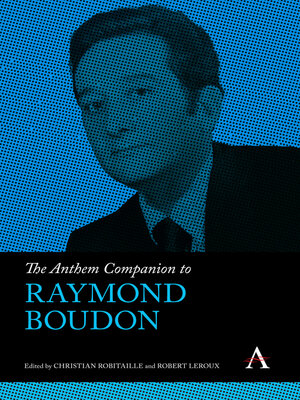The Anthem Companion to Raymond Boudon
ebook ∣ Anthem Companions to Sociology
By Christian Robitaille

Sign up to save your library
With an OverDrive account, you can save your favorite libraries for at-a-glance information about availability. Find out more about OverDrive accounts.
Find this title in Libby, the library reading app by OverDrive.



Search for a digital library with this title
Title found at these libraries:
| Library Name | Distance |
|---|---|
| Loading... |
This book seeks to identify the main threads of a resolutely complex course of thought which has contributed greatly to sociology. Although he founded no "school," Raymond Boudon certainly made original contributions to the discipline in his own time, including his theory of rationality, his interpretation of the work of the founders of sociology, and his explanation of educational inequalities. He also presented convincing arguments about how the overly narrow utilitarianism of mainstream economists was incomplete and betrayed major theoretical gaps. It is true in any case that his thought laid the groundwork for many theoretical and empirical social studies. Through an analysis of the most important parts of this thought, each of the chapters will not merely demonstrate the scientific rigor which can be associated to his work, but also show how it remains relevant to our understanding of contemporary society and how it can hence be used for future research projects.
There can be no doubt, Boudon's thought has for various reasons undergone new assessments. Chapters of this book hence reflect a variety of points of view on how his work can be understood, criticized, and used for future research endeavors.
|This book seeks to identify the main threads of a resolutely complex course of thought which has contributed greatly to sociology. Although he founded no "school," Raymond Boudon certainly made original contributions to the discipline in his own time, including his theory of rationality, his interpretation of the work of the founders of sociology, and his explanation of educational inequalities. He also presented convincing arguments about how the overly narrow utilitarianism of mainstream economists was incomplete and betrayed major theoretical gaps. It is true in any case that his thought laid the groundwork for many theoretical and empirical social studies. Through an analysis of the most important parts of this thought, each of the chapters will not merely demonstrate the scientific rigor which can be associated to his work, but also show how it remains relevant to our understanding of contemporary society and how it can hence be used for future research projects.
There can be no doubt, Boudon's thought has for various reasons undergone new assessments. Chapters included in this book hence reflect a variety of points of view on how his work can be understood, criticized, and used for future research endeavors.
The authors of this book are from different horizons. The present collection of essays, as will be seen, includes contributors from no fewer than two or three generations of social scientists whose thinking is rooted in many different intellectual traditions. Yet, these scholars all share in common a special concern for how Boudon's work can be seen as being of great importance for the proper understanding of social phenomena.







